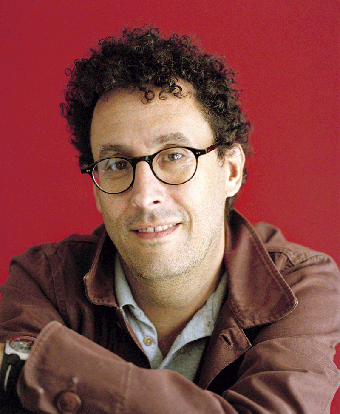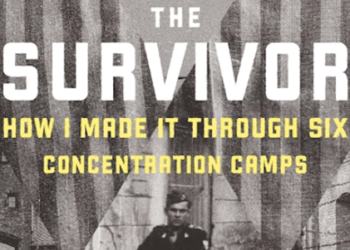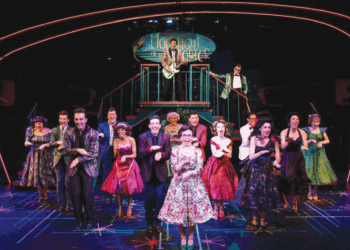I dreamed about Tony Kushner the night before last. My repeated inquiries to the Guthrie Theater publicist about arranging a Jewish World interview with the renowned playwright finally bore fruit — albeit in dreamland. I was sitting with Kushner at a cafe table on a downtown Minneapolis street. He thoughtfully brought me a gift — a box of foreign postage stamps. I commented that stamp collecting had been a childhood hobby; I was introduced to philately by an uncle whose family had fled from Vienna, Austria, ahead of the Nazi invasion. I noticed that the storefronts around us all had signs with Chinese characters, and I remarked, I didn’t know that Minneapolis had a Chinatown.
On Monday night, the Guthrie Theater’s “Global Voices” forum featured a conversation with playwright Tony Kushner. Joe Dowling, the Guthrie’s artistic director, moderated the talk.Â
Before Kushner unleashed his cascade of words, the Twin Cities Gay Men’s Chorus performed a song titled “I Want More Life,” a new commission with text from Kushner’s Angels in America, part two: Perestroika, and music by Michael Shaieb. It was a stirring, affecting musical number.
Over the course of an hour-and-a-half, Kushner, who is being celebrated at the Guthrie this month — his three productions occupying all of the Guthrie’s stages were reviewed in the Jewish World here and here — talked about the wellsprings of his theatrical creations, socialist politics and growing up Jewish in Lake Charles, Louisiana.Â
The first question from Dowling was about why Kushner chose theater as the medium for his artistic expression. And he responded that theater is a “metaphor for human consciousness.” Theater, according to Kushner, presents the “doubleness” of reality — life and its illusion. He said that if we are “to live in history, and not be the fools of history,” we need to be able to see the doubleness of “what reality means” — essentially, what is beyond the superficial spectacles.Â
Kushner said that theater is “all about the creation of unsuccessful illusion”; and illustrated the point with a reference to the end of Hamlet, where a vigorous duel has left the stage littered with corpses. The actors have been dashing around, so the corpses actually are gasping for breath after their exertions. “The experience of watching these things on stage is to experience the doubleness of life,” said Kushner, who added that it is “the antithesis of Reaganism.”
Where New York Times columnist Frank Rich had spoken on the Guthrie stage some weeks ago, repeatedly scoring the depredations of the Bush/Cheney years, Kushner frequently referred to the “Reagan counter-revolution.”
In answering an audience member’s question about the origins of Angels in America, the 53-year-old playwright mentioned that it came at time “when the country was turning the corner” into a “terrifying” new political and social experiment, which sought to undo the innovations of the manifold 1960s revolutions; and at the same time, a “biological catastrophe,” AIDS, was cutting a swath through an “unprotected and persecuted minority.”
Kushner decided to write about Roy Cohn, an aide to the late Joe McCarthy, the senator from Wisconsin who launched a notorious Communist witch hunt in the 1950s, after reading a “disgusting and shocking” obituary of Cohn by Robert Sherrill in The Nation magazine; in interviews, Kushner, who happens now to be on The Nation’s board of directors, has said that the Sherrill piece was “completely homophobic.”Â
He told the Guthrie audience that Cohn was “one of the worst people who ever lived,” but, after reading Sherrill’s obituary, “I find that I suddenly was feeling bad for him.” Kushner added that Cohn, in abetting McCarthyism, engaged in a “dalliance with something resembling fascism.”
Also, when he was commissioned to write Angels in America, Kushner received a U.S. Treasury check — funding from the National Endowment for the Arts — and he was fascinated with the watermark on the check, which depicted the Great Seal of the U.S.A., with the mystic eye atop the pyramid. The check was from “the people of the United States,” which inspired him to write a really long play dealing with this country’s history; Angels in America is subtitled “A Gay Fantasia on National Themes.”
“I’m a great believer in American democracy,” Kushner commented.Â
Joe Dowling asked about the origins of the play Homebody/Kabul, which was written prior to the 9/11 terrorist attacks, but presaged the U.S.-led war against the Taliban regime in Afghanistan. Dowling observed that the play remains topical, to which Kushner responded: “If you write about current events, you have a pretty good chance your plays are going to be current.”
Kushner, still discussing Homebody/Kabul, railed against Reaganism, asserting that the parties of the right generally “have no internal coherence,” but stick together because of an “appetite for power at all costs.” He traced the course of U.S. involvement in Afghanistan, going back to this nation’s support for the resistance to the Soviet Red Army occupiers. He noted that “America was in some sense directly responsible” for the emergence of the Taliban, who he called “theocratic cave people.”
In response to another audience question, about his impetus for writing the new play, The Intelligent Homosexual’s Guide to Capitalism and Socialism with a Key to the Scriptures — which had its world premiere on May 22 at the Guthrie — Kushner replied that he wanted to write a family drama. He mentioned his great regard for American playwright Arthur Miller; and noted that The Intelligent Homosexual’s Guide is a “requiem mass for a kind of politics” embodied by a bygone generation.Â
As the words poured out, accompanied by continually fluttering hand movements, Kushner described the Civil Rights movement as the “apotheosis” of the kind of social change he believed in. “Revolution is born out of exigency,” said the self-proclaimed socialist. The nascent labor movement — personified in the new play by the character of Gus Marcantonio — employed “questionable” means to advance it aims, but Kushner said it wasn’t for him to question the tactics used.Â
“It’s more comfortable not being a revolutionary,” Kushner observed, in regard to the sacrifice involved in struggling for profound societal change at the ordained moment. He illustrated this point with a story from Tsfat, the center of medieval Jewish mysticism. The Messiah shows up and tells the Jews: “Let’s go to Jerusalem.” They tell him that they first have to put their tools away, put the sheep into the pen, etc. By the time they have attended to the mundance chores, the Messiah has vanished. “They missed the moment,” the playwright concluded.
Toward the end of the audience Q & A, Kushner was amused by a question — I think it was posed by Rabbi Joseph Edelheit — about the “Jew inside” him, about growing up Jewish in Louisiana. He talked about his parents, both classical musicians, and the atmosphere of Lake Charles, which was not “stridently anti-Semitic.” The Jews were a distinct minority, however, and Kushner said he was raised in a “strong, proud Jewish family.” His parents taught him to “embrace the identity that is not accepted… embrace your pariah status.” His mother imparted a firm sense of social justice; his father communicated a commitment to social justice rooted in the Jewish ethical tradition.
“When I came out of the closet,” Kushner remarked, “I took all of that teaching and turned it on them. They didn’t have a chance.”
In response to a question, Kushner expressed his great enthusiasm for Barack Obama, who emerged at a “transitional moment” in American history — like the revolutionary founders (Franklin, Adams, Jefferson, et al.) and like Abraham Lincoln. Of course, according to Kushner, after eight years of the Bush administration, “Socks the cat would have been an improvement.” As far as advice for the new president, Kushner said, “It’s time to repeal ‘don’t ask, don’t tell,'” the official policy regarding gays and lesbians in the U.S. military.
Kushner’s new play will go to Broadway next year, but he said that the work, which was “written in a sort of fever,” would not be made “all tidy” for its New York City premiere. He will preserve the play’s “feverish” quality.
The ongoing celebration at the Guthrie has been a “soul-changing and life-changing experience for me,” said Kushner, who has been “electrified” by what he found in the Twin Cities. “I’ll never forget this and I’ll never stop feeling enormously grateful for this.”
— Mordecai Specktor






















Comments 0